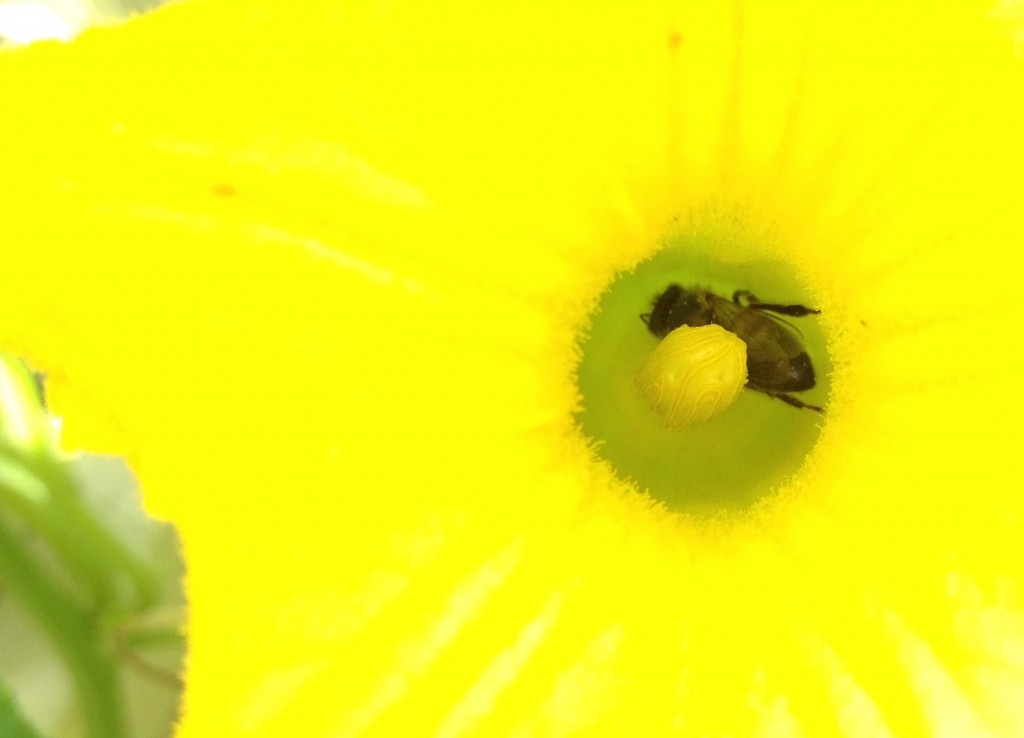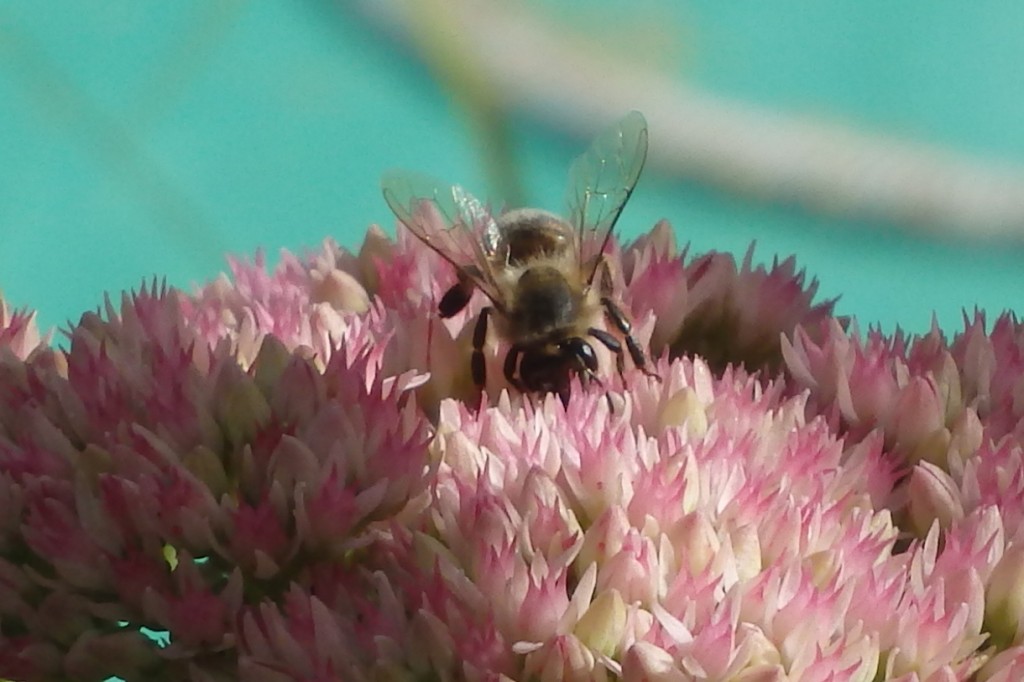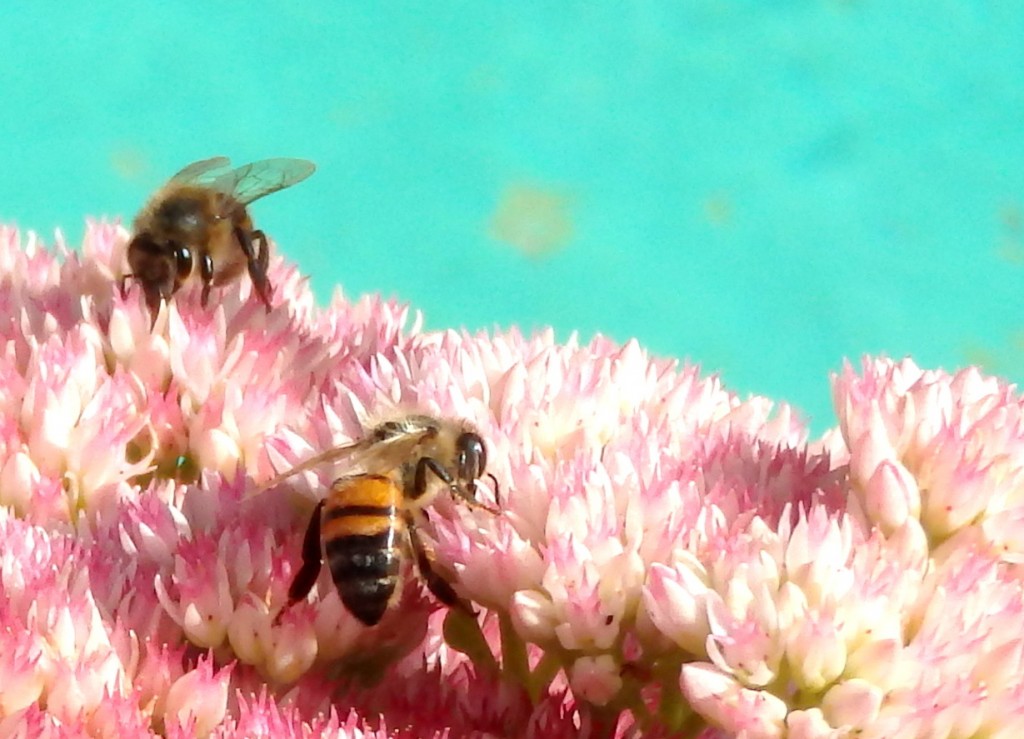Just like all gardeners, we love bees. These little insects do us a fabulous service around our organic garden, pollinating all of the fruit and vegetables for us to eat.
Life without them would be unthinkable. Colony Collapse Disorder really has me worried.
So, Kim and I decided to start capturing Bee moments in our garden to document what they are up to. Over the next few weeks we are going to see how active the bee population really is around here, and try to capture them close up on film. Within this post are the three moments we have captured to date.
We are not sure where the local bee hives are around here, but now that the heat of summer has past, they are out in droves.
Thankfully we have some sort of flowers in bloom most of the year round, so there is plenty of pollen and nectar for them to collect.
I really love watching them going about their work. The old adage, Busy as a Bee, really rings true when you take the time to observe these fascinating insects. They are poetry in motion.
Thankfully, modern digital cameras allow me to stand well back when taking these shots, due to my bee sting allergy. I can take them at very high resolution, then zoom right in. Just brilliant.
So what do you say? Have you ever taken the time to stop and just watch bees at work? What are your thoughts on Colony Collapse Disorder and the fate of the humble bee?
How will we cope without them if the worst comes to pass?




I love watching my bees working the garden and also flying off into the great blue yonder to work my community’s gardens as well.
Of course I have an added bonus of being able to sample the fruits of their labour when I extract the honey 🙂
And I must say Mick that their honey is delicious. We use it every day in smoothies or as medicine for sore throuts.
I purposefully plant flowers that I know the bees like – if every gardener did this?
I agree Jane. If everyone planted varieties like borage and comfrey or even marigolds, the bees would flock to their gardens. Plus the plants themselves are great for the garden.
Hi Gavin,
I have to admit I feel sick every time I hear about the plight of the bees. I agree with frugalqueen2 about planting flowers that attract bees. I’d also love to have my own hives – in spite of being quite scared about the harvesting process!
I met a lovely young guy who lives in London, and he told me that over there they are being encouraged to put beehives on their rooftop gardens. It’s encouraging to see that people are seeking to address the problem.
Like anything, though, we have to get to the root cause of the problem and not just put on bandaids. While we can all keep voicing our disagreement over the shameful behaviour of companies like Monsanto, I wonder if some of our energy might be better directed towards the people who stock the poisonous food grown with Monsanto’s products? Maybe more and more of us need to let supermarkets and greengrocers and manufacturers know why we are not buying their products?
And I guess somehow educating people about the problem, especially the cause of the problem, might go some way towards turning the tide in a healthier direction?
As my long answer suggest, there isn’t a simple answer!
Have a great day,
Madeleine.x
PS: really enjoyed your photos, Gav 🙂
I tend to agree Madeleine. The biggest contributing cause is farmers forced to use these products due to society’s perception of good looking, nutritious fruit and veg. My home grown organic fare probably has twice the nutritional value than the supermarket stuff, but doesn’t look a pretty, sometimes has blemishes, but I love it.
It is good for me, my family, and all the insects that inhabit my garden, including the busy bees!
If the worst comes to pass and bees disappear we are going to want to hope like hell that the world eases up on the glyphosate which is believed to be killing the butterflies as they and other insects will be our only easy pollination means left. Unless we then climb every apple tree, visit every flower and hand pollinate that is. I don’t mind pollinating my curcurbits but I’ll pass on everything else I think.
We have a truck about 1km away with heaps of hives thereon. I guess our local pollinators come from there.
Hi Jessie. There are parts of China where pollinators do not exist (can’t remember where I saw this fun fact).
The farmers hire humans to do the job of the bees and butterflies. As you can imagine, it is extremely labour intensive, and certainly not sustainable in the long run.
Gav x
Because of this bee problem I am thinking of getting my own hive. Hubby thinks that all bees sting, but now we have set his mind at rest that there are stingless bees, perhaps we can change his mind after all.
I want bees as we usually have lots of flowers on our trees (eg plums) but very little fruit sets. Unlike the Chinese you mention above, I am not very good at pollinating the flowers. Actually, the Chinese weren’t either!